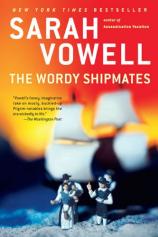The Wordy Shipmates
Review
The Wordy Shipmates
Sarah Vowell, like many of us, was likely introduced to "the
shining city on the hill" by President Ronald Reagan. Reagan used
the metaphor to describe the America people longed for, an
admirable and special place that other nations could emulate. "In
my mind it was a tall proud city built on rocks stronger than
oceans, wind-swept, God-blessed, and teeming with people of all
kinds living in harmony and peace," Reagan said. "A city with free
ports that hummed with commerce and creativity, and if there had to
be city walls, the walls had doors and the doors were open to
anyone with the will and the heart to get here. That's how I saw it
and see it still."
Reagan, of course, was borrowing from Puritan leader John
Winthrop, who gave his famous "city on a hill" speech to his
followers as they came from England to their new home in America in
1630. These Puritans, who would go on to found the city that would
become Boston, had an opportunity to build their own society from
the ground up.
"...we must consider that we shall be as a city upon a hill, the
eyes of all people are upon us," Winthrop told his fellow
immigrants. "So that if we shall deal falsely with our God in this
work we have undertaken, and so cause Him to withdraw His present
help from us, we shall shame the faces of many of God's worthy
servants, and cause their prayers to be turned into curses."
They looked for guidance, not from their home in England but
from more ancient role models. How many people in our supposedly
devout nation of Christians recognize the true source of the words
as Jesus Christ? In Winthrop's time, the reference would be
obvious. Jesus's words come from Matthew and inspired Winthrop
and the Puritans deeply.
"You are the light of the world," Jesus told his followers in
his famous Sermon on the Mount. "A city set on a hill cannot be
hid. Nor do men light a lamp and put it under a bushel, but on a
stand, and it gives light to all in the house. Let your light so
shine before men, that they may see your good works and give glory
to your Father who is in heaven."
Today, an alleged evangelical like Sarah Palin credits the
phrase to Reagan, apparently unaware of its biblical background.
It's a contrast Vowell spends plenty of time on. For all of
their faults, these Puritans understood and studied the Bible. They
were also obsessed with learning, making a point to create Harvard
University to educate their young leaders. It’s a stark
contrast when compared to modern conservative leaders who consider
educated men "elitist" and want to place the Ten Commandments in
public schools yet cannot name all 10. As Vowell shows, these
modern religious leaders have all of the egotism of their
forefathers, but it isn't egotism that is tempered
by humility, devotion and fear.
Vowell is one of our most interesting writers, always sure to
bring a unique perspective and modern twist to her historical
wanderings. It speaks volumes that she has successfully made a book
inspired by Puritan sermons interesting and vital. It isn't nearly
as breezy or as easy a read as her previous, more personal essays
in ASSASSINATION VACATION, but it's worth the effort to
see where the roots of American Puritanism were laid and how far
modern religious leaders have drifted from their influences.
Reviewed by Jonathan Snowden on January 24, 2011
The Wordy Shipmates
- Publication Date: October 6, 2009
- Genres: History, Nonfiction
- Paperback: 272 pages
- Publisher: Riverhead Trade
- ISBN-10: 1594484007
- ISBN-13: 9781594484001





